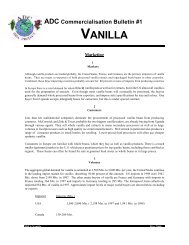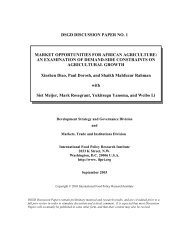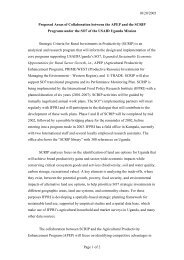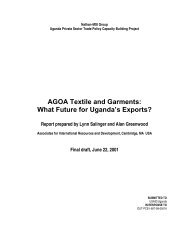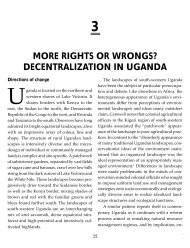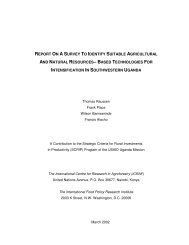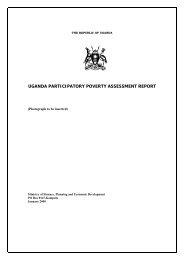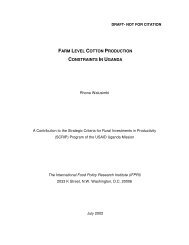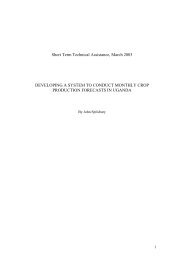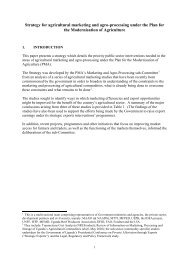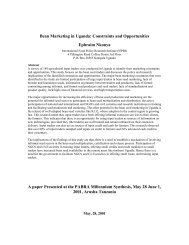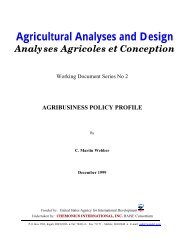Continuities in environmental narratives, Kabale, Uganda ... - Foodnet
Continuities in environmental narratives, Kabale, Uganda ... - Foodnet
Continuities in environmental narratives, Kabale, Uganda ... - Foodnet
Create successful ePaper yourself
Turn your PDF publications into a flip-book with our unique Google optimized e-Paper software.
unwise to cont<strong>in</strong>ue under the present conditions <strong>in</strong> the hope that further soil deterioration and<br />
erosion will not take place.’ 36 These f<strong>in</strong>d<strong>in</strong>gs confirmed earlier fears that serious <strong>environmental</strong><br />
degradation was likely to occur <strong>in</strong> the area unless dramatic steps were taken. Although Purseglove<br />
played a crucial role <strong>in</strong> br<strong>in</strong>g<strong>in</strong>g Kigezi to centre stage, his f<strong>in</strong>d<strong>in</strong>gs were not particularly groundbreak<strong>in</strong>g<br />
or <strong>in</strong>novative. On the contrary many previous officials had discussed the problems of overpopulation,<br />
soil erosion and fall<strong>in</strong>g yields. Kigezi’s reputation as ‘over-populated’ was firmly<br />
entrenched <strong>in</strong> the colonial m<strong>in</strong>d by the time Purseglove arrived <strong>in</strong> the district, but he greatly<br />
<strong>in</strong>creased the attention on the district.<br />
In the case of soil conservation policies, <strong>Kabale</strong> presents a rather unusual case, for here<br />
soil conservation measures were implemented successfully, with little resistance from local<br />
populations. The soil conservation measures <strong>in</strong>cluded strip cropp<strong>in</strong>g and bund<strong>in</strong>g. But contour<br />
cultivation and a system of cultivation that led to the formation of ridges along the contour were<br />
part of the <strong>in</strong>digenous system of agriculture and earliest measures <strong>in</strong>troduced (such as plant<strong>in</strong>g of<br />
elephant grass along the contour and narrow plots along the contour) were thus modifications to<br />
this system. 37 That soil conservation policies were implemented without opposition is <strong>in</strong> such stark<br />
contrast to other areas where similar attempts were made. Some of the reasons for this <strong>in</strong>clude the<br />
degree to which measures be<strong>in</strong>g <strong>in</strong>troduced differed from <strong>in</strong>digenous methods of erosion control;<br />
the amount of additional labour <strong>in</strong>put that was necessary to implement measures; the extent to<br />
which local conditions were taken <strong>in</strong>to account <strong>in</strong> the formulation of these schemes and the extent to<br />
which officials on the ground were able to adapt measures to local conditions. In Kigezi the earliest<br />
colonial policies were essentially modifications of the Bakiga agricultural system. Measures were<br />
<strong>in</strong>troduced gradually and, <strong>in</strong> comparison to similar schemes elsewhere, greater effort was put <strong>in</strong>to<br />
education, propaganda, and the provision of <strong>in</strong>centives. By work<strong>in</strong>g directly through chiefs, plac<strong>in</strong>g<br />
responsibility on them, and giv<strong>in</strong>g them authority to both judge and punish, the adm<strong>in</strong>istration was<br />
broadly successful <strong>in</strong> gett<strong>in</strong>g conservation measures carried out. Additionally, suspicions of the<br />
government’s motives, fears of los<strong>in</strong>g land to Europeans and the rise of nationalism was critical<br />
<strong>in</strong>gredients miss<strong>in</strong>g <strong>in</strong> Kigezi, which <strong>in</strong> other areas facilitated the articulation of discontent. F<strong>in</strong>ally<br />
and crucially, the Agriculture Department was flexible enough to drop those parts of the scheme<br />
that proved <strong>in</strong>appropriate suggest<strong>in</strong>g greater attention was given to local responses to policies than<br />
elsewhere. 38<br />
A key component of the policies <strong>in</strong>troduced as a result of concerns about overpopulation<br />
was resettlement. Throughout Purseglove’s period <strong>in</strong> <strong>Kabale</strong>, resettlement was presented as a great<br />
success and <strong>in</strong>deed the aim of resettl<strong>in</strong>g 20,000 people, as suggested <strong>in</strong> Purseglove’s report, 39 was<br />
met. But with Purseglove’s departure from the district <strong>in</strong> 1952, there was some reassessment and<br />
K<strong>in</strong>g, the new DAO, observed that the value of resettlement scheme was often overstated as it had<br />
never managed to achieve the resettlement of the natural <strong>in</strong>crease of population. 40 By 1953 22,002<br />
36 Ibid., paras 13 and 93.<br />
37 Indigenous farm<strong>in</strong>g methods <strong>in</strong>clude contour cultivation, ridges and mounds for root crops, trash l<strong>in</strong>es, cultivation<br />
to form ridges, high use of legumes, cont<strong>in</strong>uous plant cover through <strong>in</strong>ter- and serial-cropp<strong>in</strong>g. See Carswell,<br />
‘Soil conservation policies <strong>in</strong> colonial Kigezi’ and W.R.S. Critchley, C. Reij and T.J. Willcocks, ‘Indigenous soil<br />
and water conservation: a review of the state of knowledge and prospects for build<strong>in</strong>g on traditions’, Land<br />
Degradation and Rehabilitation 5 (1994), 293-314.<br />
38 Carswell, ‘Soil conservation policies <strong>in</strong> colonial Kigezi’.<br />
39 Purseglove, ‘Report on the Overpopulated Areas of Kigezi’, para 96.<br />
40 Letter to PAO from K<strong>in</strong>g, DAO, 7 May 1953, KDA DoA 012-3 ff8.<br />
D:\_<strong>Uganda</strong> Land Use\SW land use and soils\Carswell papers\Carswell- Narratives paper-17 Dec.doc<br />
7



